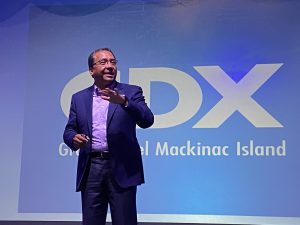Meeting Mentor Magazine
What’s Really Ahead for Meetings and Events

Michael Dominguez, President and CEO, Association Luxury Hotel International, speaking at CDX 2021
Michael Dominguez, President and CEO, Association Luxury Hotels International (AHLI), has become a bit famous in the meetings and events industry for his informative updates on world events and their impact on meetings and hospitality. His general session, “The Need to Be Decisively Indecisive — Understanding Behavioral Changes for the Meeting and Event Industry,” at ConferenceDirect’s CDX meeting held Aug. 30-31 at the Grand Hotel on Mackinac Island, Mich., was no exception.
He began by explaining affective forecasting, which entails predicting how much a life event, say the COVID-19 pandemic, is likely to affect you. The problem is that we often get it wrong, he said. For example, despite plentiful news reports about a “new normal” entailing much more of the U.S. workforce toiling away at home, the work-from-home trend is not going to stick around long term, he said. In fact, working from home has increased burnout and decreased work-life balance and employee morale. He cited a 2020 U.S. Work from Home study that found that only 12% of U.S. workers, especially younger generations, want to work from home. They want to get back to the office. That’s why companies from Morgan Stanley to Google and Facebook have already announced they would be requiring people to return to the office in the near future.
The reason we tend to get it wrong, he said, is because of cognitive bias, which causes people to believe news that aligns with what they already believe, without doing any research, and to dismiss out of hand news that does not align with those beliefs. In the case of COVID, the U.S. mainstream media tends to focus on negative coverage, he said, such as reporting the surge several areas of the U.S. are seeing due to the delta variant, rather than where the surge is subsiding. He cited a report that found this negative slant to be less prevalent in local and regional U.S. news sources, and even less so in international media outlets.
“Without context, the content is useless,” he said, providing evidence that the current surge in the U.S. is already waning as transmission rates decline state by state, and death rates from this surge also are less than in previous surges due to increased vaccination rates and a younger population constituting much of the current case load. “This is an important message specifically for those thinking about meetings in the future. The great Wayne Gretzky quote is, ‘You need to skate to where the puck is going to be, not where it is.’” While COVID likely will never be eradicated, “My point is, don’t just buy into the narrative. Really understand what’s going on.”
For conference organizers, it’s important to determine what you’re trying to accomplish when instituting COVID-related protocols, he added. If you want to institute a proof-of-vaccination mandate, know that it may not create a COVID-free bubble, especially now that there are breakthrough cases among the vaccinated and a question of if boosters will be needed, which means you also would need to know when everyone in attendance was vaccinated. If you just want to create a sense of comfort, then a proof-of-vaccine mandate could accomplish that goal, but you would need a comprehensive testing program to truly create a COVID-free bubble, he said.
What This Means for Meetings
Dominguez pointed out that, according to a SimpleView CRM review of data from more than 250 U.S. destination marketing organizations (DMOs), room nights now are pacing only about 20% below where they were in 2019, and he predicts that gap will continue to shrink as event planners begin to increase bookings in early 2022. The distribution of event start dates for RFPs submitted in the Cvent Supplier Network (CSN) in 2021 also tracked closely to those in 2019.
Of course, circumstances change from market to market. He showed another CSN data graph of market demand pace that delineated destinations that were weaker in 2021 and predicted to be stronger in 2022 (Los Angeles and Northern New Jersey, for example); those that were stronger in 2021 and likely to be weaker in 2022 (San Antonio and Austin); those that were weaker in both years (San Francisco, Washington, D.C., Atlanta, Charlotte, Baltimore, Philadelphia, Chicago, Minneapolis/St. Paul, Portland, Seattle, Denver, Indianapolis, St. Louis, New York, New Orleans, Boston, Kansas City, Louisville and Houston); and those that were stronger in both years (Orlando, Phoenix/Scottsdale, the Caribbean, Fort Lauderdale, Miami, Tampa/Clearwater, Nashville, Dallas/Fort Worth, Orange County, San Diego, Las Vegas, Salt Lake City and Charleston).
Those that have been strongest in both years are mainly resort destinations, and those that are weaker in most years are metro cities, he said. The latter are taking longer to come back due to lags in business and international travel, which means they’re going to have more space and more opportunities. So instead of Florida in January, you may want to go to New York or Chicago — they’re going to have more flexibility.
This is good news for hotels as well as planners, Dominguez said, because rates are already back up to 2019 levels. This is because this isn’t being driven by the two-month recession — people who are not traveling won’t be traveling due to health reasons, not economic concerns, so hotels didn’t drop rates the way they usually would during an economic crisis. And leisure is coming back very quickly. The corporate market is ramping up, and the association market is already moving forward in terms of average daily rate (ADR) starting in Q1 of 2022, according to CSN data, he said.
In terms of types of hotels, independents and luxury/upper upscale hotels, which constitute the majority of meeting properties, all are seeing increasing ADR. Economy/upscale are getting back to 2019 levels but not necessarily increasing at this point.
Design by: Loewy Design